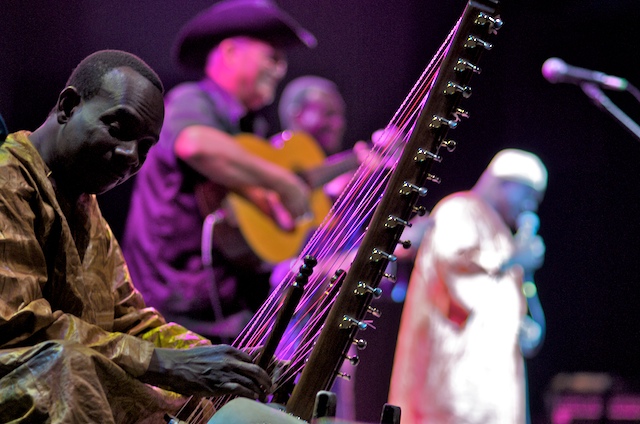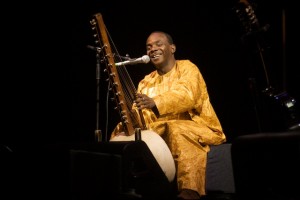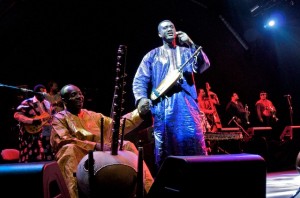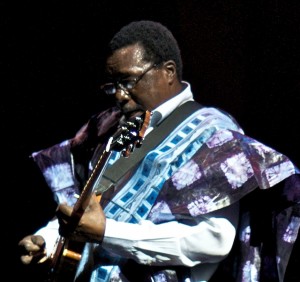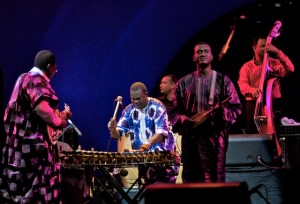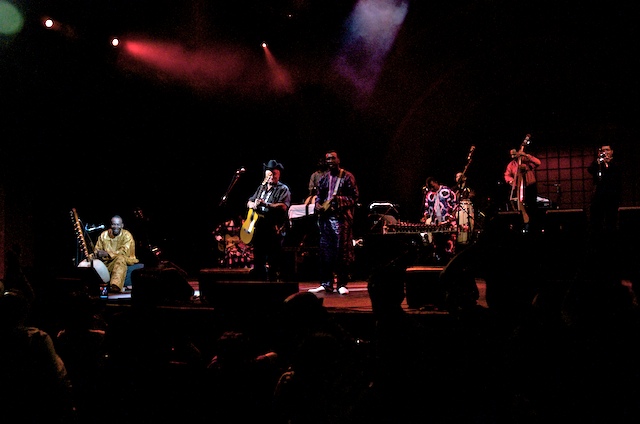AfroCubism is a unique summit of musicians from Mali and Cuba, making good on the original concept behind the Buena Vista Social Club. (See CD review for more.) Since the last time this band passed through New York, Mali has undergone a rebellion in the north, a military coup, a resulting refugee crisis and, for the time being, division into two political entities. The rebel territory, Azawad, is now largely under Shariah law, and experiencing terrible violence.
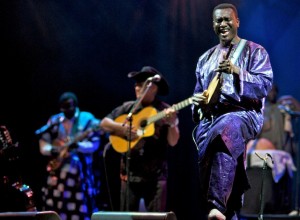
As it happens, the demands of a major concert involving so many artists left little time for in depth conversation. But we did manage brief, after-show interviews with Toumani Diabate, Bassekou Kouyate and Djelimady Tounkara. These conversations are frustratingly brief, but they do add pieces to the puzzle that is today’s Mali.of this was expected, and it has left Malians, as well as fans of Malian culture and music, perplexed and worried. Since Afrocubism includes royalty of Malian music, and in particular, master griots, known throughout history for their command of history and their skills at negotiation and problem solving, we took advantage of AfroCubism’s June 9, 2012, concert at Celebrate Brooklyn to get some further insight to the situation in Mali.
On stage during the concert in Brooklyn, Toumani asked the audience to be "Ambassadors for Mali." He spoke of the “terrorist” takeover of the Malian north, and the imposition of Shariah law, and sought to distance the vast majority of Malians from all of that. "We have been Muslims for over 1000 years,” said the kora maestro. “This is something else.” Afropop’s Banning Eyre started from there speaking in English with Toumani.
Banning Eyre: Toumani, you said that you wanted people to be ambassadors for Mali. What did you mean by that?
Toumani Diabate: You know. Mali is a great cultural country. It's a great historical country. I think Mali is connected with the rest of the whole world, on culture, and many other things. If Mali gets problems like this, I think the whole world has the same problem.
B.E.: And what is the problem?
T.D.: People know what is happening today in Mali, about the terrorists in the
north of Mali, trying to bring Shariah. Mali is a Muslim country: 95% or 98% Muslims in Mali. And if you want to be a spiritual guide, you can be a spiritual guide. But at the same time, you cannot force others to try to do these things. And killing people is really bad. That's why I talk about the whole relationship with different countries, the European Union and America, because they have stopped giving help to Mali. So it seems like if that stops moving, there is no future for our kids. Because they go to the school three days a week. They spend a lot of time not going to school. Other people are suffering. We have more than 300,000 people moving from their houses.
B.E.: Refugees, yes. That's a lot of new people in Bamako. How is that changing life?
T.D.: Well, things are getting very hard. The prices are going up everywhere, for everything. So it makes sense for other people to make their own business, [including drugs.] We don't need the narco trafficking in the North. We don't need that system to come with a lot of violence and killing.
B.E.: The drug trade has a lot to do with what's happening in the North, doesn't it? People know about the Tuareg rebellion, and about the Islamists. But that's not the whole story. In fact, I think that Americans, fans of the music, are very confused about what's happening in Mali. Can you help us understand?
T.D.: Absolutely. Absolutely. There are a lot of people making this bad business in the North of Mali, selling drugs, and with that money, take the money and make a team to kill people and provide arms, guns and that stuff. I don't think the world needs that today. And Mali is a country where people have always been sitting and talking—palabra. We sit under the tree, and we talk. That's the way it always was. We have sanankouya in Mali. Our ancestors brought all of those kinds of things to save the peace in Mali
B.E.: Sanankouya. That's the system where cousins and clans who are related have rights to joke with each other, and even insult each other. And this is a way that peace has been kept between clans and ethnic groups.
T.D.: That's it. Exactly. Like, in Mali, if you start fighting with somebody, and if you know later that you are sanankou, then you have to stop. And the dispute will become peaceful.
B.E.: You've always talked to me about the fact that being a griot means more than being a musician. There's a role of talking and negotiating, and bringing peace. So what is going to be the role of griots in fixing these problems in Mali?
T.D.: This is what we are doing. We had contact with the government, the new 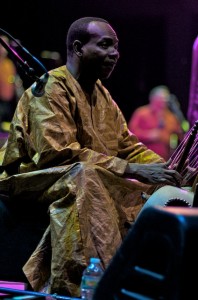
government, the Prime Minister. We are lucky we got a chance—thank God—to go outside of Mali, playing New York, playing Toronto, playing Paris. So this griot role is still there. Because this is the way that we are now talking to the people to help them understand, because they are so confused with the Internet, and with most of the TV news. So that brings more confusion to the people, so they don't know exactly what's happening here. So that's why we say, “Please, please, don't stop the relationship, the connection with Mali.” When your friends have a problem, you know, we have this proverb in Mali. You know your good friends because you see your good friends when you have a problem. So when you have a problem an old friend stops every connection with you, that's no good. So that's why I say, "Okay, people, we need you to be ambassadors for Mali, to bring peace in Mali."
We have to talk. You know how many thousands of people have we met through this Afrocubism tour? So if all of those guys can speak and give more understanding about what's happening in Mali, I think that will bring about more peaceful and make people more happy about what's going on, and understand better.
B.E.: I hope so. I spoke with one griot who lives here in New York, and she was very worried because she said that Malians have always solved these kinds of problems through talking, but it's very hard to talk with people who don't share this culture. I'm not sure exactly who she was referring to, but she was worried about the people in charge of the North, and whether it was possible to use the culture that's held Mali together, especially jaliya, griotism, to fix this problem, because the people in the north don't share that culture. What do you think of that?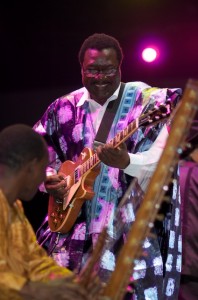
T.D.: Well, I think she's not in Mali. We live in Mali. We are all born in Mali. And there's two kinds of teams. One team is living in Mali and comes here to perform, to tour, touring around the world. And the other team is living in Europe or America, or outside of the country. And it's exactly someone who did know this culture but is living in New York, reading the newspapers, or watching the TV. So they don't understand what's going on. This is why I think it's necessary for us to be on the road to talk to the people, to give more explanation about what's going on in Mali today. The only thing is just to bring peace, to be ambassadors. That's the whole thing.
B.E.: So what can people do?
T.D.: Talk to the government here. Don't stop helping Mali. Mali is a friendly country. We are your friends. Mali is your friend. And the musicians here, we've been nominated and getting Grammys. We are always playing for you. And now, today, it's hard. There are no more people coming to visit Mali. Because on the website, they say everywhere, "Stop, don't go to Mali. Stop, don't go to Mali. Stop, don't go to Mali." Why? Because when people go to Mali [they support the country.] That's why I say the African Union cannot do these things. Mali doesn't have power to fight those people [in the north].
B.E.: Do you think that's what has to happen, fighting those people?
T.D.: Yes, but first there have to be negotiations.
Toumani had more to say, but the cars were waiting, so we cut off and caught a quick word with Bassekou Kouyate, leader of Ngoni Ba.
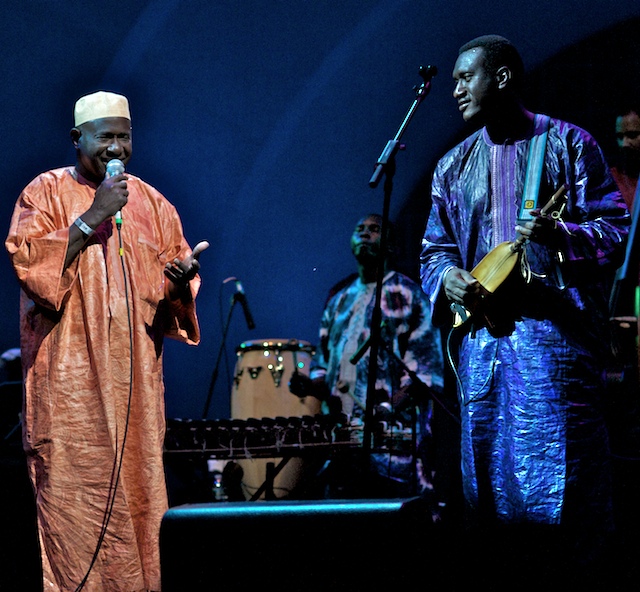 Kasse Mady Diabate with Bassekou Kouyate
Kasse Mady Diabate with Bassekou Kouyate
B.E.: Bassekou I must ask you what your message is for the listeners who are very confused oh what's happening in Mali. Obviously it's a complicated situation, but what can you tell us that we haven't been reading in the papers?
Bassekou Kouyate: Well, I think that what has happened in Mali, no one fully understands. There's no one who could've said, "One day this is going to happen in Mali." We are poor. We don't need this. When I see people whether they are Traores or Diarras picking up guns and killing one another, that is not normal. That's not the way at all. I hope Toumani has explained to you. This is not part of Mali. I don't know where we've come to. But I believe that this will end. This will not last. This will not last long. We had a very good democracy in our country, that ever
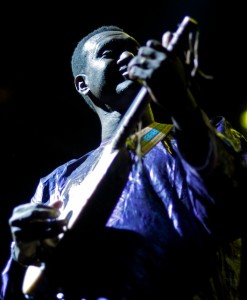
yone loved. We knew nothing about guns and fighting, fighting amongst each other? No we did not know that. We don't want war. Me, I hate war. I don't want to see anyone bringing war to us. That is not good.
B.E.: This is where I had just arrived with Toumani when we had to stop. Do you think it's possible to fix this situation without war?
B.K.: This can be fixed. Right now, this is starting to be fixed, because the rebels havebegun to speak. To negotiate. They are in the process of fixing this. But me, I do not want war in our country. We do not wish for war. Always, Mali has been about negotiation. We talk. We've always done this. And the president has said this. The voice of negotiation is better than the voice of arms. The force of arms is not good. I think it's starting to come right. It will come right in the end. If God wills it.
Finally, we had a chance to speak with master guitarist Djelimady Tounkara. Banning lived with Djelimady for much of 1995 and 96, while researching the book “In Griot Time, An American Guitarist in Mali.” Now, as then, Djelimady watches political developments in Mali with a keen eye and much enthusiasm. Just the same, and not surprisingly, he would rather talk about music.
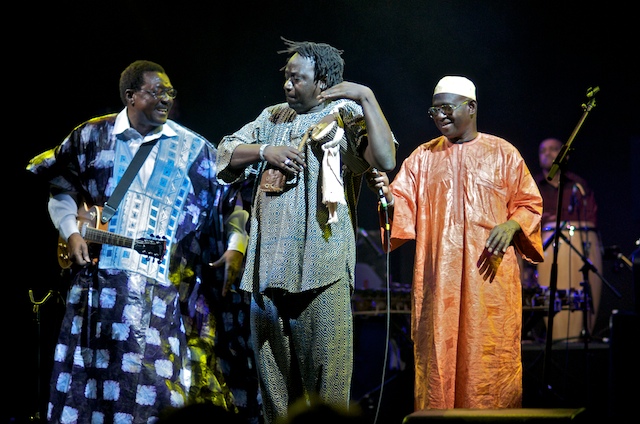 Djelimady Tounkara, Yacouba Sissoko, Kasse Mady Diabate
Djelimady Tounkara, Yacouba Sissoko, Kasse Mady Diabate
Djelimady Tounkara: You see, this concert now? It's better than the record.
B.E.: The last time I saw it, it was better than the record. Now it's even better.
D.T.: Now, it's even better.
B.E.: Djelimady, as much as I would love to talk about music, we don't have 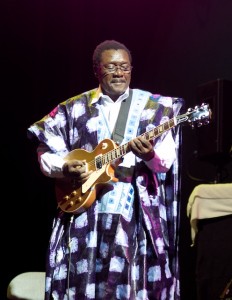
much time, and I have to ask you about the situation in Mali. When we lived together in the mid-90s, in Bamako, we couldn't have imagined such things. How did this happen?
D.T.: Yes. Well, it happened this way. It astonished everyone. Because ATT [now deposed president Alpha Toumani Toure] worked hard. Because Mali is too big. There were no roads, and if there are no roads, there's no communication. And communication brings everything. So ATT, he put roads everywhere. You can drive from Kita to Bamako. You can drive to Gao. All over Mali, it's a single language now. Everyone speaks proper Bambara. That's communication that has done that. It's a national language. We now have contact and cohesion among ourselves. So you had to build roads, and also hospitals. He also built a lot of hospitals. This is very important.
B.E.: But I have also heard that there were people who thought his government had become very corrupt. And that they were giving money to certain people in the military, and not others. I heard that there was a bigger division between rich and poor in the country and that people resented that. Is this why so many Malian’s supported the coup?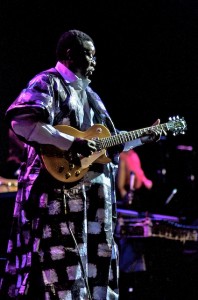
D.T.: Yes, well, first, before the coup came the rebellion [in the north]. ATT always believed in negotiation. He negotiated with the rebels. He did not want war. Always, he is the mediator. He was trying to mediate this situation in Algeria. When they wanted to come and make war against us, he was always going to Algeria to sit down and talk. He gave money to people. He did not want war.
ATT, in the end, the mistake he made -- and it was not really a mistake -- his politics was about keeping Mali out of wars. Guns and all that. All the money he had, he invested in hospitals and roads. Also, education, students. All that was very good. Even we, the artists, we have our royalties now. Our royalties from SACEM were blocked before. When SACEM pays royalties, the government used to take used to take 65%. Now that's been lowered to 25 or 30%.
B.E.: So he built hospitals and roads, and he helped artists, and he did not invest in the Army, and the military.
D.T.: Right. Because in the past, Mali didn't really need a military. We have to tell the truth. Only in the North was there a problem. He tried to find a solution so that all these people can stay together. He invested in Kidal. If you visit Kidal, you will see that it's more beautiful now than Kayes. He built a road the whole way there.
B.E.: And now Kidal is part of Azawad, the rebel territory. Will Azawad last? Is it possible to get the North back?
D.T.: For now, it's not possible. Because the way that they came, we don't know
where they came from. There are those who say they came from Libya. Me, I don't believe that. Because Libya, they had their war until they killed Qaddafi. They killed a lot of the military. Most of the ones who left left without guns. All these arms that came into Mali, I don't think they all came from Libya.
B.E.: Where do they come from then?
D.T.: Maybe Al Qaeda. Because we know they are there. I don't even think they are Malians. They're not Malians.
B.E.: I understand that drug trafficking has a lot to do with what's going on up there.
D.T.: Yes. Drug traffickers. Before, before, they found more than 25 tons of drugs in Timbuktu. The military at that point was in Timbuktu. An airplane came, and no one knew where it had come from. They found everything. But afterwards, the Malian military burned everything.
D.T.: Two or three years ago. But these guys, I don't know where they came from. They were helped from the outside. Now, a lot of Malians are putting their faith in America. Because America declared that it was not in agreement with this new territory. They said this clearly, that they did not support this new republic. When the military made its coup d'état, it was America that very much helped our president. This guy who made the coup, he was a captain. There are generals. There are colonels. It is not possible that a captain could have run Mali. He couldn't. But he's understood this now, so we will treat him as a former president. He has left. So I think things are starting to come right. But now, to reverse this rebellion, it is not easy. It is not easy now.
With that understatement, Djelimady joined the others and hit the road again. We will continue to speak with Malian artists about the situation in their country. Their perspective is uniquely revealing. One last note. Before he left, Toumani planted seeds for a benefit concert for Mali to be held in New York in September. Toumani said he might even come and join the lineup himself. Watch this space for more on that as well.







